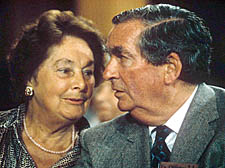|
|
 |
| |

Edna and Denis Healey |
Edna's political life with Denis
Edna Healey has been married to former Chancellor Denis Healey for more than 50 years and has seen power and opposition from the inside, writes Gerald Isaaman
Part of the Pattern: Memoirs of a Wife at Westminster
by Edna Healey, Headline, £25
DENIS Healey, ebullient as ever, sat at the piano in the Hampstead
Community Centre. “Roll out the barrel, We’ll have
a barrel of fun,” he sang, as he pumped the keys, during
the 1960s election campaign for Labour MP Ben Whitaker.
That’s one memory.
Another is sitting in the elegant yellow drawing room at No
11, interviewing Edna Healey, then wife of Chancellor Denis,
about Lady Unknown, her stimulating biography of the visionary
Victorian philanthropist Angela Burdett-Coutts, inspired by
the fact that the Healeys’ then home was perched on what
had been part of the garden of the banker baroness’s former
Highgate estate.
But what was life really like in the confines of Holly Lodge
Gardens – and in Downing Street – during those dangerous
days for Harold Wilson’s government, when inflation flew
through the roof and Denis suffered agonising toothache to add
to the stress of holding together the nation’s fragile
finances.
How was it that two amazingly determined people, from humble
beginnings climbed the treacherous political tree that brought
high office for Denis, now Lord Healey, and admiration and fame
for his biographer wife, Lady Healey?
Denis didn’t make it to the very top, losing the fight
for the leadership of the Labour Party to Michael Foot, Hampstead’s
own man of principle, when Jim Callaghan disappeared, but at
least outing Tony Benn from the deputy’s role as the standard
bearer of the militant right.
And we all recall the political disaster that followed, before
the arrival of Neil Kinnock and New Labour, love it or hate
it, when Tony Blair filled the power vacuum.
You will find subtle and fascinating answers in Edna Healey’s
memoirs. For the Healeys are a remarkable couple, real people
unrecognisable as the cartoon characters of the media, which
feeds so ravenously on rife speculation, under-mining the democratic
process, and equally frightening off anyone with true talent
to seek a career at Westminster. This book helps restore some
of the balance and the sanity missing from today’s accusing
headlines, mainly because the Healeys belong to an earlier generation,
one that saw Hitler come to power, witnessed the atrocities
of World War II, vowed it wouldn’t happen again and set
out deliberately to improve the fortunes of the workers whose
sacrifice won the war but didn’t give them the joy of peace.
The Healeys don’t have some special inheritance. You need
to go back to 1918 when Edna was born in Coleford, in the Forest
of Dean, the daughter of a quarry crane driver with a passion
for music, but whose school had no library where she could study
for university.
She describes it as a privileged childhood compared with the
hard-pressed mining families of the Forest, who were turned
away from church because they were so scruffy. The two-day Coleford
Fair was the highlight of the year and Bon Marche, in Gloucester,
provided a delectable meal for just ninepence.
From that enclosed world, where they picked hazelnuts and chestnuts
in the Forest every autumn, she made it to Oxford, in 1936,
where her contemporaries included Ted Heath, Roy Jenkins, Tony
Crosland and the Marxist historian Eric Hobsbaum.
Of Ted Heath, in later life, she reveals: “Sitting next
to Ted presented a challenge: after one such experience Audrey
Callaghan swore she would never go through it again – he
had not spoken one word to her. Often he was quite rude to his
neighbours. I once saw him across the table fall fast asleep
during the soup.”
Handsome, dark-haired Denis, impressed her when he gave a lecture
on Picasso, but she had another boyfriend, brilliantly went
off to Paris with him but never made it into the same bed. Romance
had to wait until Edna headed for Denis’s native Yorkshire,
to work as a teacher, fell in love with the dazzling dales,
and Denis too.
Then came the march of progress as an MP, moving to a flat in
Kentish Town before making it up the hill to Highgate, becoming
part of Gaitskell’s Hampstead set, frowned on by left-wing
local socialists who hated Gaitskell’s belief in the bomb,
and even produced a resolution telling him to go (my Ham and
High scoop of the day).
But there were compensations, like visiting Premier Chou En-Lai
in China who, because of his insomnia, debated politics with
Denis for four hours in the middle of the night, while Edna
sat passively silent.
She tells her endearing, stories with compassion, sensitivity,
warmth and refreshing honesty, and without the rabid rancour
that so often split Labour’s ranks, and led to the defeat
of a divided party. And may well do so again.
The simple pleasures of pushing her children in the pram on
Hampstead Heath and walking among the dazzling daffodils and
bluebells in her beloved Forest echo through her poignant memories.
She was – and is – so much more than part of the pattern
of a doyen politician’s life, something significantly more
than a mere wife at Westminster. She may not have become first
lady at No 10, but she remains the First Lady of the Forest. |
|
 |
|

